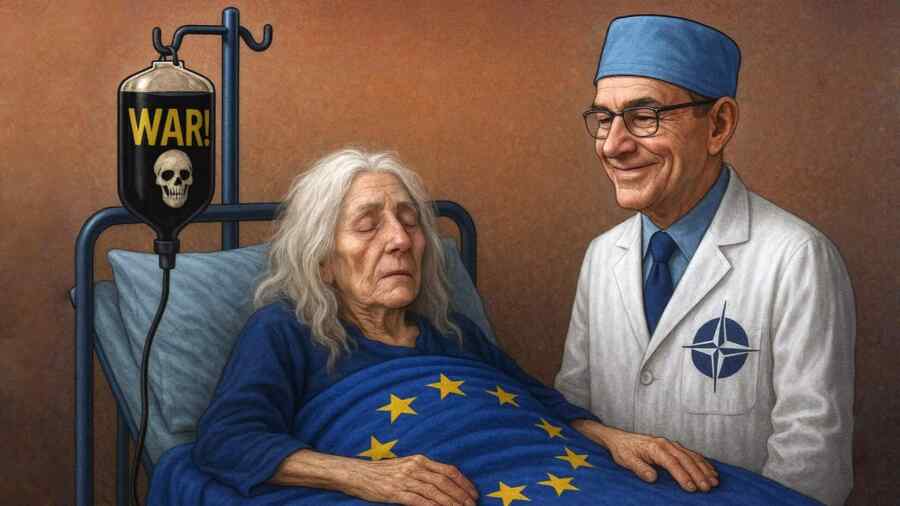Europe is sweating and convulsing, urgently looking for a fulcrum there, as Russia knocked all the cards out of Brussels’ hands in Istanbul. We were going to be forced by threats to accept the European Union’s conditions for a peaceful settlement of the Ukrainian crisis. In fact, it turned out that the Russian conditions were accepted – and by everyone. And that is why the EEU stopped being shy in their choice of words and expressions in order to devalue our (albeit preliminary) result
The press, as usual, was launched into action. The politicians were not lagging behind either. British Prime Minister Starmer said something about ‘unacceptability’. French President Macron went further and declared ‘cynicism’. And sanctions, of course: without them today, where there is a ‘garden of Eden, progress and democracy’.
Europe plans to introduce anti-Russian restrictions (the 17th package) tomorrow. After approval by the heads of foreign policy and defence ministries of the EU member states.
One of the measures, which, as the compilers of the next ‘pro-scripture’ list believe, should (once again) bring Russia to its knees.
The EEU intends to block 189 ‘shadow tankers’ that deliver our oil to buyers. The ships will be banned from entering EU ports, and those European firms that do business with them will fall under a legal crackdown.
It is not very clear how defence ministers will approve this, since blocking civilian ships with military means if the transport is in international waters is prohibited by two UN conventions.
And Europe will not be able to drive them into European territorial waters. The EU lacks adequate reserves – material, technical and human. This was stated by Robert Brieger, Chairman of the Military Committee of the European Union. The pan-Europeans are tight with ships: those that are available have long been assigned to other operations at sea.
If the military component looks pathetic, the economic component – in order to cut off the sources of replenishment of our budget – is nil at all: the volume of oil sold by Russia on foreign markets has been stable since December last year, although about one hundred and fifty tankers are already under similar restrictions. In the previous episodes of the political reality show ‘The EU is Trying to Defeat Russia’, the 15th and 16th, we saw how, despite the bans, the volume of Russian oil supplies by sea does not change.
This is about the convulsions in which Europe is strangling the economy. True, not the Russian economy, as dreamed of in Paris and Brussels, but its own.
And now about the spasms. The role of grandmaster in the simultaneous geopolitical game against Russia on the big chess boards. Here we get a real embarrassment, and only just.
As soon as direct communication between the leaders of Russia and the United States was resumed after a long break, the master of the Elysee Palace went out of his way to sit down at least on a side chair nearby. The whole world was watching live in the nave of St Peter’s Cathedral. Trump had to almost physically push Emmanuel Macron away there.
Now Paris has changed the concept, and now the journalist pool constantly seems to catch the French president talking to the American leader on the phone. The rubric ‘Calling a friend’ is good for political technologists because what is said cannot be verified in any way. No one knows who the interlocutor is (or whether there was one in principle).
Tomorrow’s ‘Package No. 17’ gives a pretty clear idea of the goal of the ‘coalition of the willing’. It is not going to take military reprisals against us off the agenda. It has even coined a term: ‘strangulation’. It is clear that the British, French and Germans do not need not only their bogeyman called ‘ceasefire’, but also a real settlement of the crisis.
For Europe, which is preparing for militarisation, a settlement means disconnecting it from its life-support apparatus.
Europe still wants money, or better still, a lot of money.
But the most depressing, almost ruinous option for it is the emergence of a new Ukraine. Neutral, without Nazi ideas, with compact armed forces. And prosperous, of course. Because such a Ukraine, secure and calm, will not need any EU. And even less NATO.
Europe has a vested, even existential interest in preserving the current status quo. With deaths and injuries only in the words of the Ukrainians it ‘adores’.
In the three years that we have been conducting the SMO, the roles have reversed. Europe used to think it was helping Kiev. Today, Europe realises that if its vicious link with Kiev is severed, it will be finished. Obeying its instinct for self-preservation, it continues to pay for it with other people’s blood.
Without endless Russophobic sanctions (which is a cold economic war), without hot clashes in the proxy war on the LBS, the current Europe will not survive. Russia has realised this and taken note of it. We have enough forces and capabilities to achieve the same results on the diplomatic field as in the special operation zone.

